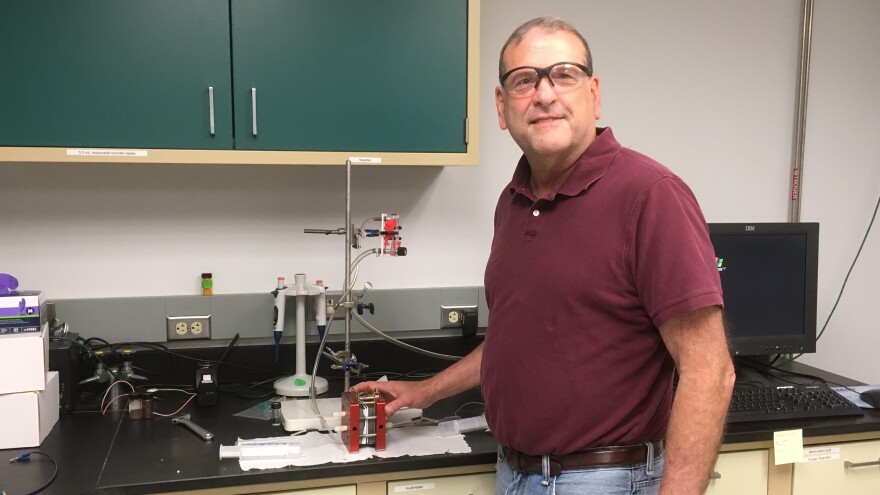The world is looking for ways to store the power generated by wind farms and solar panels. A Michigan State University researcher is working on one way to do that efficiently and, possibly, more safely.
The MSU Bioeconomy Institute, nestled next to Lake Macatawa in Holland, Michigan, is the home of the Organic Energy Storage Laboratory. In this lab, Tom Guarr has been working on a project linking his MSU research with a company he and a business partner run called Jolt Energy Storage Technologies.
News coverage of exploding cell phones and electric cars bursting into flame led Guarr to conclude that the major cause of these potentially disastrous problems was the overcharging of batteries, a problem he thought he could solve. "Through some molecular modeling in the computer, we designed some compounds that we thought would work, meet all the necessary requirements, and last for a long time," Guarr explains. "We went into the lab, made the compounds and tested them, and lo and behold, they did work."
Guarr has found an organic solution to battery storage. The result was a molecule never made before, one that’s safer to handle in the manufacturing and disposal processes. He says that according to the Environmental Protection Agency, it’s harmless to plant and animal life. "Initially, our organic material was just an additive for the lithium ion batteries, to prevent overcharge," Guarr continues. "It actually improves the safety, improves efficiency, and it offers the opportunity to decrease cost."
The resulting all-organic battery contains no lithium, manganese, cadmium, or cobalt, the undesirable metals typically found in batteries.
Guarr and his company won a Shark Tank-style competition earlier this year for the opportunity to further his research at the Argonne National Laboratory’s Chain Reaction Innovations Program. There, Guarr now has access to advanced troubleshooting facilities and remarkable testing equipment.
When asked for a best-case scenario of where this work might lead, Guarr expresses a desire to start at the utility level. As an example, Guarr says his company recently purchased a 16 channel tester. Argonne has dozens of 64 channel testers, all more capable than Jolt's.
Anything invented here becomes the intellectual property of Michigan State University. Multiple patents have been applied for, and all are assigned to MSU. Jolt Energy Storage has licensed the technology back from the university and will continue to do so.
Cheaper and safer: if successful, Tom Guarr’s company and MSU could change the face of America’s energy producers.



